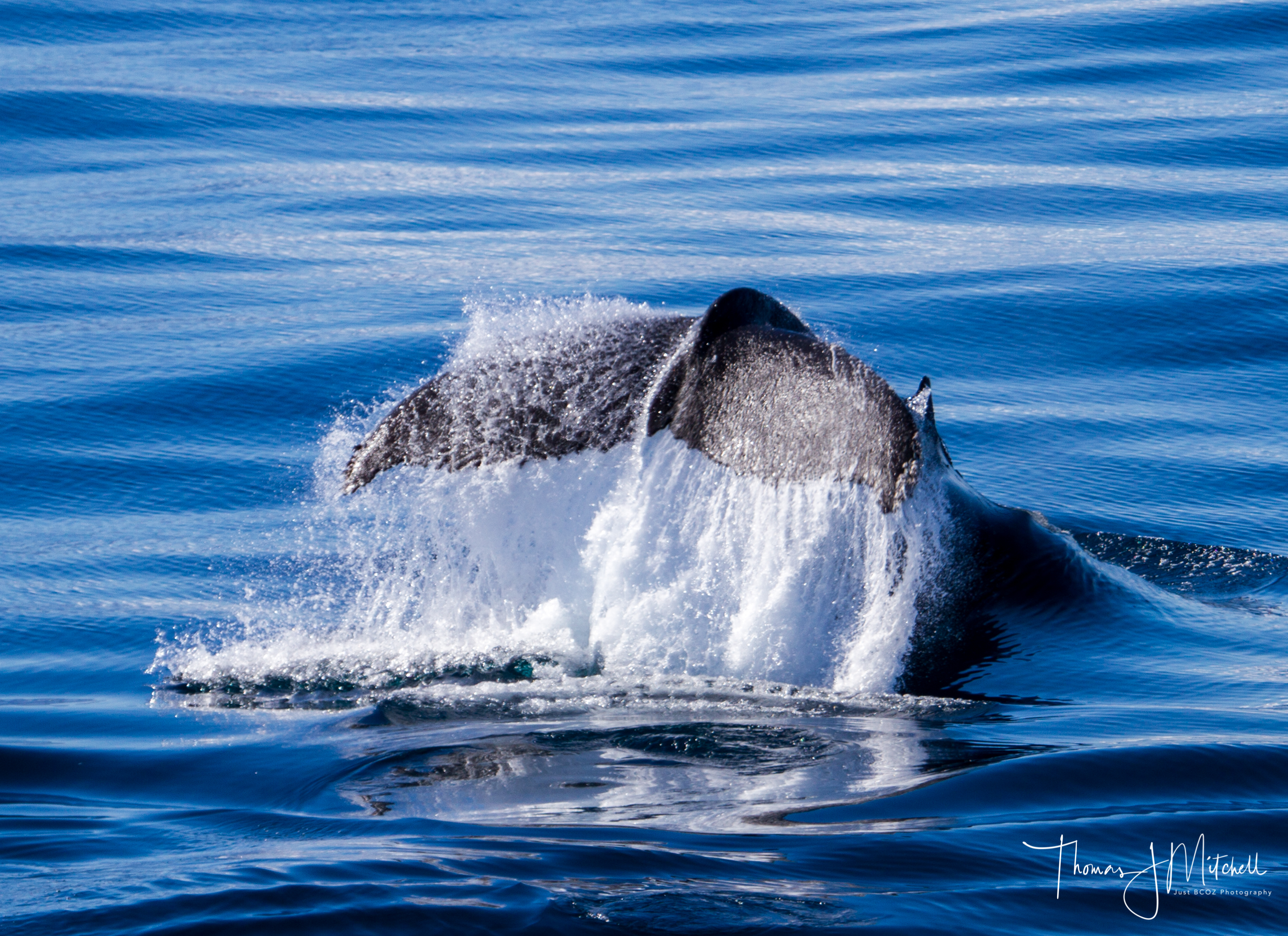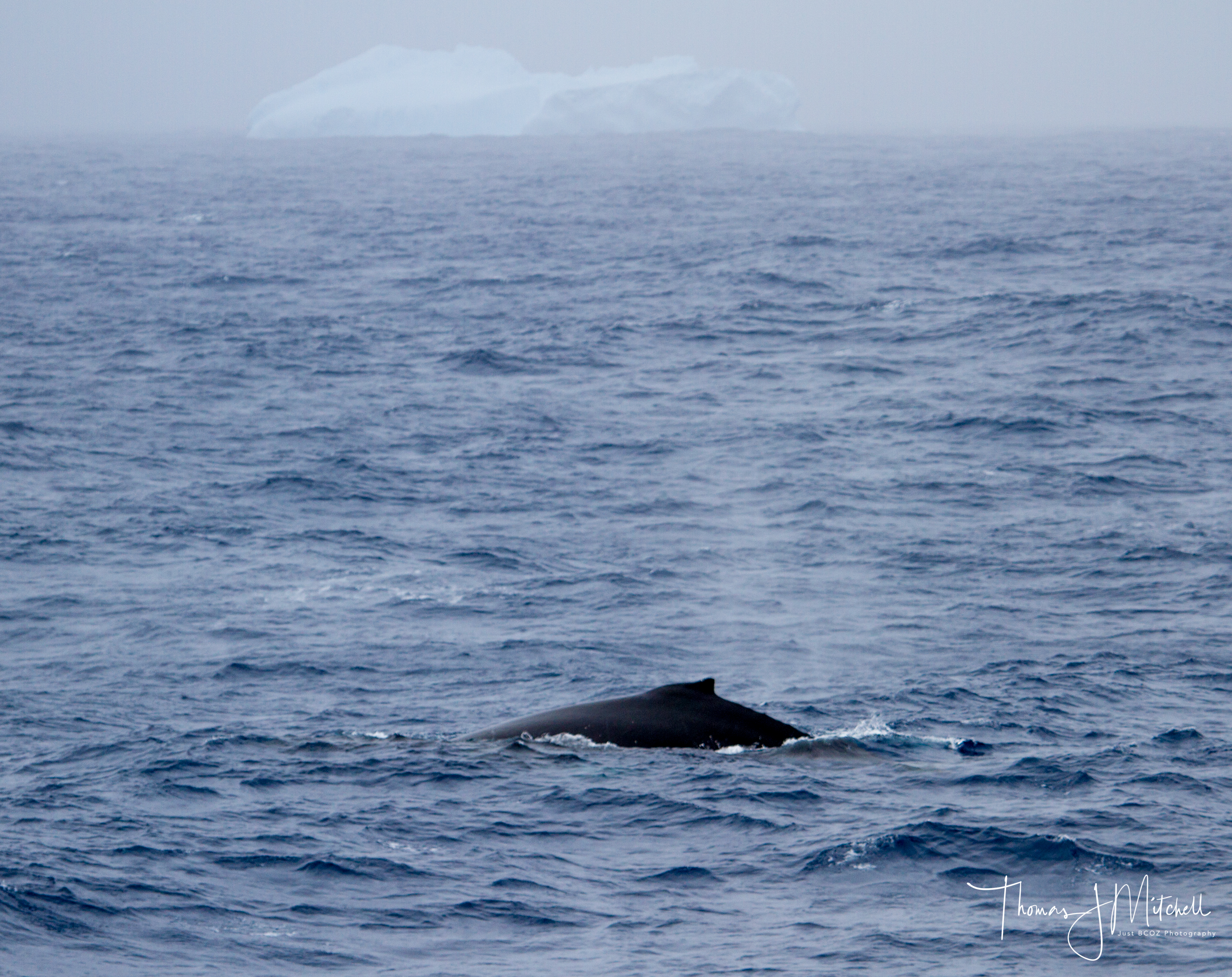Finding whales in the ocean - easy, right...?!?!
Seems easy, right? I mean whales are huge!! How could you not find them…?? Well, let me give you a small little explanation of what we are looking for in order to interact with them and it isn’t as easy as you may think.
Prior to even getting on the water to begin the search we are learning. What do we need to learn? Everything! We are learning about current and predicted weather conditions, tides, currents and seeing if there have been any previous sightings reported. Then we make a plan of where we might go in order to locate some of these majestic giants.

A young juvenile humpback whale tail lobbing next to my vessel.
The first thing a whale does as it breaks the surface is exhales, which explodes upwards, as if someone has just fired a canon straight into the sky. What is that mist? Well, its mainly warm air from their lungs hitting the cold, that and some bacteria, surfactant (lubricant lipid mucus that helps to re-inflate and deflate their lungs as they dive) & a few other little goodies are in there too. They do inhale before disappearing below the surface. From the moment they are visible to disappearing again is roughly about 5 - 7 seconds. Usually, an animal will take a series of breaths every 20-30 seconds for about 5 - 10 times. Then they will descend for a longer deeper dive for several minutes and this does vary from species to species.
Even though that blow is quite huge - you typically need to be about 1 - 1.5 miles away in order to see it. So not only do you have to be quite close to this large mammal but you also have seconds to look at the right spot and that right time in order to potentially find it. Or the animal itself breaches and jumps out of the water to announce its location - super rare, it has happened to me on occasion but don’t hold your breath on the animal helping you out every time.

Fin whale blow from about 3-4NM away in the Bransfield Strait.
I have seen many captains drive within 2 miles of animals and not located them. I have seen captains drive straight past whales, as they were currently on a long dive (about 10 mins) and the captain kept driving not knowing an animal was below.
Also, the weather is a major factor when it comes to level of difficulty to locating whales too. If it is quite windy and lots of white caps have formed on the surface then spotting a blow becomes very difficult. The blow isn’t easy to see, as it gets blown away and the animal itself becomes essentially invisible in the backdrop of a rough sea.

humpback blending into its surroundings with an iceberg in the background somewhere in the Drake Passage.
All you can really do is ALWAYS keep looking. When I have guests on my trips I do apologize to them straight away that I never look at them when I am talking to them. I look past them and am constantly turning from side to side scanning. I have found countless animals that way, which is what I am there to do and why they paid money to be on my vessel. Well, that and to make sure I bring them back to the dock in somewhat similar condition in which I found them ;)
More eyes the better. Typically, when working on the water with numerous vessels we will function as a team, a unit. Throughout the search we will be in constant communication, letting the other vessels aware of where we went, what we saw and where we are planning on going next. This helps us all to search an even larger area and essential drastically increases our chances of finding something. By the way, Binoculars help!! For obvious reasons.

a young male orca cruising in calm waters during sunset.
So, to recap! You have to be within a mile as this animal surfaces. Thats 1. Two, you need to be looking at the right place at that right time (5-7 seconds), when the animal is at surface. Three, keep looking - always keep looking. Four, more eyes the better and lastly don’t forget your binoculars. Just remember practice makes perfect. That and a lot of training and understanding of the species ecology BUT practice does help.
Hope you found this slightly insightful into the difficult world of actually locating the beautiful, majestic animals I get to encounter and work with around the world.
Thanks for reading and all the support!!
For more stories and photos check out my Instagram feed: https://www.instagram.com/thomas_mitchell2912/
Wow! Amazing! Were you not scared?
I wonder! @rhubarb
There is nothing beautiful than nature
Ocean is such a mysterious place for me. Who knows what lies deep?
Watch Into The Heart of The Sea.
Nice movie based on Moby Dick
Very beautiful, one day must witness.
what an amazing post. its a scientifically proven the article you written. Its good information for the steemians. Thanks for sharing the valuable post. i love
Nice article.

I have to do my research when taking pictures of animals. They are a bitch to find and take a picture of. Unlike us humans, everyday is a fight for surivie.
beautiful nature.
very good post dear...👌👌👌👌👌
Wow...I'm hopping over to find your intro post now because I just need to know your backstory. You do some seriously amazing stuff